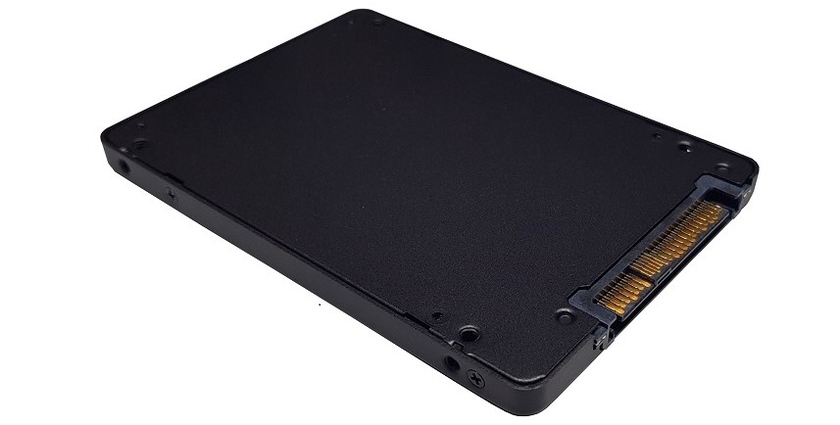| Developers: | GS Nanotech, Opti-Soft |
| Last Release Date: | 2020/07/13 |
| Technology: | DWH |
Content |
Main article: SSD is the Solid state drive
2020
Zaklyucheniiye of Minpromtorg about confirmation of production of SATA SSD of M.2 2258 format in the territory of the Russian Federation
On July 13, 2020 it became known that the development center and productions of microelectronics GS Nanotech (as a part of GS Group holding) received the decision of Minpromtorg about confirmation of production of solid-state non-volatile data storage devices (SSD) of own development in the territory of the Russian Federation. It is the first SSD in the register of the industrial output made in the territory of the Russian Federation.
| This important event for our company as Russian producer. Turning on of GS Nanotech solid state drives in the register allows us to use those preferences and measures of support which were developed by the Government of the Russian Federation for domestic developers and producers. So, gives the chance to further develop products and technologies. Now certification there undergoes one more our model of the drive, we expect to complete all procedures in August. Further we are going to receive such decisions on all SSD models made by GS Nanotech — the development director of production of GS Group holding Fedor Boyarkov noted |
Order of the Government of the Russian Federation No. 878 of 7/10/2019 sets a priority for products included in the unified register of the industrial output made in the territory of the Russian Federation when purchasing by the state and state companies. So, at biddings the rule "third wheel" is applied to the state needs: if at least two requests with the goods included in the register are submitted, then all foreign requests are subject to a deviation. In tenders of public legal entities the Russian electronic products have 30 percent preference: if the price of delivery of these goods is higher, than foreign, but within 30%, then the domestic radio electronics wins.
GS Group since 2016 implements the Russia's first project on development and mass production of SSD (about engl. "solid-state drive", solid state drives) — nonmechanical memory devices on the basis of memory chips with the managing controller. In February, 2018 the GS Group holding started mass production of SSD of own development. Today the producer offers the whole line of solid state drives of a consumer and corporate class with a capacity up to 2 TB in several form factors with the SATA 3 and PCI Express NVMe interfaces. At the heart of SSD the memory modules made by GS Nanotech as a part of which — the last generation of crystals of NAND memory from world leading manufacturers are used.
All production cycle — development and design of SSD, packaging of modules of NAND memory, component mounting on a payment, final assembly and packaging of products — is implemented in the innovation cluster Technopolice GS which capacities allow to produce more than 1 million solid state drives a year.
The register of the industrial output made in the territory of the Russian Federation includes model of the GS SSD co solid state drive by the following characteristics:
- Form factor: M.2 2258
- Interface: SATA 3 (6 Gbps)
- Capacity: 240 GB
- Memory type: 3D MLC
- Maximum speed of consecutive reading: 450 Mbps
- Maximum speed of consecutive record: 480 Mbps
- Maximum speed of accidental reading: 70000 IOPS
- Maximum speed of accidental record: 74000 IOPS
- Temperature range: 0... +70 °C
- Resource: up to 2 cycles of rewriting of complete volume of the drive a day
- Reservation coefficient: 1/16
Representation of prototypes of SSD NVMe in U.2 form factor
On March 4, 2020 the Development center and productions of microelectronics GS Nanotech and the Petrozavodsk state university provided prototypes of the solid state drive (SSD) of NVMe in a form factor of U.2 created especially for creation of the high-performance storage systems (SS) on the basis of all-flash of solutions. It is the first SSD in such form factor which is completely developed in the Russian Federation and manufactured on the basis of the NAND memory korpusirovanny in Russia. For March, 2020 it is the greatest possible level of localization of such devices in the Russian Federation. Production is implemented at capacities of the innovation cluster Technopolice GS located in the Kaliningrad region.
As noted in GS Nanotech, the drive became the first product made within consortium of developers and decision makers for DWH, the agreement on which creation GS Nanotech, the Petrozavodsk state university and DEPO Computers signed in July, 2019. The purpose of consortium — development in Russia ecosystems of developers and producers of products and services for DWH and also market grouping of competitive solutions.
| "The consortium created by us has competences in packaging of NAND memory, unique for Russia, for solid state drives — the most modern and productive information media for DWH. We with partners are going to develop technical base and we will continue product development for all-flash of solutions", |
| "Development of solid state drives in a form factor of U.2 NVMe was a key project task, the implemented Petrgu and GS Nanotech within the FTP "Research and development in the priority directions of development of a scientific and technology complex of Russia for 2014-2020" the Ministry of Education and Science of the Russian Federation. Further development of the project assumes creation of high-performance solutions for DWH and DPC on the basis of the created drives NVMe. Petrgu will continue research and development in the field of the high density high-performance solutions intended for data storage and the hardware-software systems for processing and data analysis", 'Anatoly Voronin, the rector Petrgu, professor noted' |
GS Group since 2016 implements the project on development and mass production of SSD — nonmechanical memory devices on the basis of memory chips with the managing controller. In February, 2018 the GS Group holding started mass production of SSD of own development. At the heart of SSD the memory modules made by GS Nanotech as a part of which — the last generation of crystals of NAND memory from world leading manufacturers are used. All production cycle — development and design of SSD, packaging of modules of NAND memory, component mounting on a payment, final assembly and packaging of products — is implemented in the innovation cluster Technopolice GS.
2017: Investments of the Ministry of Education and Science
In October, 2017 the Russian Ministry of Education and Science announced results of tender of projects in the field of scientific research and exploratory developments in the priority directions of strategy of scientific technology development of Russia.
Among winners there was a joint project of the center of microelectronics GS Nanotech, Petrozavodsk state university and Opti-soft company. They integrated in creation of solid-state storage systems using integrated microcircuits of a high integration scale. The Ministry of Education and Science will select for it 250 million rubles until the end of 2019.
Within the project it is going to develop the first Russian non-volatile devices and storage systems and also to arrange their serial production. Total investments into project implementation are estimated at 375 million rubles.
The Ministry of Education and Science of the Russian Federation holds a competition within the federal target program "Research and Development in the Priority Directions of Development of a Scientific and Technology Complex of Russia for 2014-2020". Its purpose is formation of the competitive and effectively functioning sector of applied research and development. From 141 bids on receiving subsidies in 2017 department selected 21.
In addition to GS Nanotech, authors of the projects "Creation of the Neuropiloted Vehicle for Handicapped Category of Citizens" (Lobachevsky's university), "Development of technology and creation of production of the range of high-tech tseolitny materials for deep processing of a hydrocarbonic raw material" (Moscow State University) and "Development of technologies and components of integrated superhigh-frequency radio photonics" (MEPhI) became Petrgu and "Opti-soft", winners.




